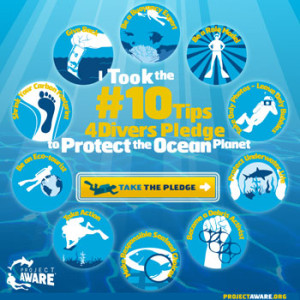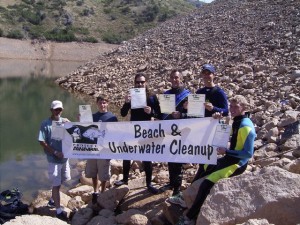Twas the night before Earth Day…
As divers, we’re natural ambassadors and advocates for the underwater world. Here are ten things you can do to help protect the aquatic world: Project AWARE’s Ten Tips

Project AWARE’s #10Tips4Divers
Be a Buoyancy Expert
Protect the aquatic world by not slamming into a reef or other sensitive environments. When you descend, you should be in control. It’s usually easier on your ears if your head is above everything else. If you assume a skydiver-like position, you can see what’s below you as you descend. Watch where you’re going and don’t drop tank-first. If it has been a while since you’ve been diving, take a refresher. I have many, many logged dives (and many I wish I had logged), but I still make time to check my buoyancy and trim when I go to a new dive site, change gear or change environments. Peak Performance Buoyancy is a great class for you to take to fast-track your buoyancy control.
Be a role model
Show the new divers that you take the aquatic environment seriously and you want to protect it. Divers often learn more from what they see other divers do than what they learned in class. So, remember what you learned in class: good buoyancy control, streamline and don’t touch. As a PADI Instructor and a PADI Course Director, I know that many divers watch what I do. I dive what I teach, because I want to be that role model.
Take only photos, leave only bubbles
A picture is worth a thousand words. An underwater photo, probably a million and even that won’t do it justice. Words and pictures can barely describe the feeling when hundreds of brightly colored fish swarm around and past you. But we can try. Learn to take photos to share the joy of the underwater world with friends. This is part of our role as ambassadors and advocates. I may not be the best of underwater photographers, but with the advent of digital photography, I’m better because I get instant feedback on the photo I just took. While it’s tempting to remove something from the aquatic world, remember everything is part of the aquatic ecosystem. Removing a shell can remove habitat for other creatures and rarely looks as good as it did when it was in it’s normal environment. [And some shells have aquatic life that can be dangerous…so don’t touch!]
Protect Underwater Life
Divers often want to think that aquatic life has human-like traits or traits of our domestic house pets. When you learn more about aquatic life in programs like the PADI Underwater Naturalist Specialty, you’ll have a better understanding of how our views are often biased. While you might want to touch a fish swimming nearby, remember that their scales are covered with a mucous-like substance to protect them and help prevent disease transmission. Petting them can damage that protective coating and leave them vulnerable to infection.
Become a Debris Activist
If you see litter, pick it up. Trash abounds, and some items made of plastic can persist in the environment for hundreds of years. During that time span, debris can trap, poison and kill aquatic life. I’ve organized several cleanups in fresh-water areas and helped clean up in marine areas. Do your part and help pick up trash that is polluting our aquatic environment. But be careful, some debris may have been turned into a home for aquatic animals, like a hermit crab in a soda can.
Make Responsible seafood choices
Many fish species are endangered or have gone extinct due to overfishing and destructive fishing practices. If you must eat seafood, be sure it’s from a sustainable fishery. While I like shrimp and lobster, I almost never eat them. Often, shrimp are collected by dredging the ocean floor, picking up everything and scraping the bottom clean. This destroys habitat and collects a lot of by-catch (non-target fish) which are often dumped. Lobster are often harvested by lobster divers in Central America. These divers dive at great risk to themselves to provide income for their families. Unfortunately, many divers often pay the price with Decompression Illness, resulting in paralysis and other maladies.
Take Action
Take a stand. Tell your elected representatives that you support strong legislation supporting marine parks, marine protected areas, sustainable fisheries and to protect our ocean planet. I’ve often written my elected officials on these topics, as well as signing many petitions to the same ends. What have you done?
Be an eco-tourist
Plan your dive trips accordingly. Choose resort and dive operations that actively protect the aquatic world. One of my favorite dive operations is Octopus Dive School at the Blue Bahia Resort on Roatan. The resort does a great job, including going the extra mile in making sure that sewage is treated properly and reducing their energy usage. Octopus Dive School actively supports the Roatan Marine Park and uses mooring buoys rather than dropping anchor on the sensitive reef.
Shrink your Carbon Footprint
What can you do at home? Start with the simple things: when you leave the room, turn off the lights. Make sure you’ve energy efficient appliances and lighting. Use reusable shopping bags rather than getting plastic bags at the grocery store. While that might be unavoidable sometimes, reuse or recycle the bags if you must use them. I’ve installed compact fluorescent lights or LED lights in most of my household light fixtures. They last longer and don’t use as much electricity. And don’t forget to turn off your computer or at least make sure it is in sleep mode. Low power on my computer still consumes about 25 watts. In sleep mode, nearly zero.
Give Back
Ocean conservation groups rely on donations and contributions to help make a difference. You can make direct donations to organizations like Project AWARE or you can do simple things like shopping at Amazon.com through the Amazon Smile program. For every purchase, Amazon donates to Project AWARE. I shop a lot at Amazon.com, and the Amazon Smile program helps me help Project AWARE.
So, what are you doing to help the aquatic world? Do you part for Earth Day and take the 10 Tips Pledge to follow the 10 Tips and protect the aquatic world!
